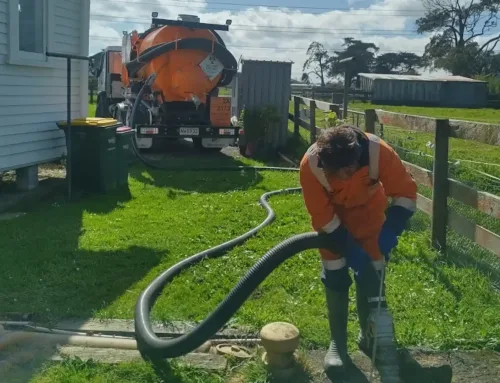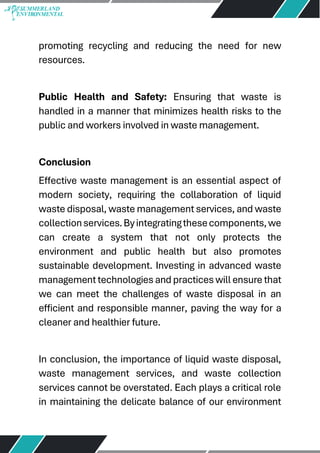Reclaim Waste for Dummies
Reclaim Waste for Dummies
Blog Article
Fascination About Reclaim Waste
Table of ContentsNot known Facts About Reclaim WasteThe 8-Second Trick For Reclaim WasteThe Ultimate Guide To Reclaim WasteWhat Does Reclaim Waste Mean?The 9-Minute Rule for Reclaim Waste
Discover the kinds, events, and types of liquid waste. Domestic sewer waste refers to the waste and items from a residential septic system. This kind of waste is produced by humans in residences, institutions, and other structures. This only includes septic tanks that have a drainpipe area. The proper administration and disposal of domestic sewer waste require liquid waste to be transferred to a sewer therapy plant where the appropriate methods and equipment are put on purify and take care of waste.
Commercial waste usually consists of possible risks, such as combustible products or a mix of fluid and strong waste items, and requires a more sophisticated and in-depth disposal process. The disposal of industrial waste typically entails the filtration of waste before transport to guarantee risk-free and correct disposal. Industrial waste is produced from by-products and drainage of industrial procedures and manufacturing.
This kind of waste can not utilize the same sewage management transportation or processes as septic or industrial liquids. The hazardous waste monitoring procedure requires the assessment and screening of fluid waste prior to it undergoes the disposal process (liquid waste disposal). Runoff waste is the liquid waste that comes from runoff and excess stormwater in highly inhabited locations or cities
Drainage waste can cause contamination and flooding otherwise taken care of correctly. Discover more about sewer cleaning and waste administration. Ensuring correct waste management can prevent catastrophes and decrease environmental injury. Both individuals in domestic setups and specialists in industrial or manufacturing industries can take advantage of recognizing the processes and guidelines of liquid waste management.
What Does Reclaim Waste Mean?
Contact PROS Solutions today to find out about our waste management and disposal solutions and the proper ways to look after the fluid waste you generate.
(https://reclaimwaste1.wordpress.com/2024/11/12/efficient-liquid-waste-disposal-in-melbourne-reclaim-wastes-expert-solutions/)This supposed 'wastewater' is not only a vital source but, after therapy, will be launched to our land, waterways or the ocean. Used water from commodes, showers, bathrooms, kitchen area sinks, laundries and industrial procedures is known as wastewater.

water used to cool down machinery or tidy plant and devices). Stormwater, a type of wastewater, is drainage that flows from farming and metropolitan areas such as roofings, parks, yards, roads, courses and seamless gutters into stormwater drains pipes, after rain. Stormwater streams unattended directly to neighborhood creeks or rivers, eventually reaching the sea.
How Reclaim Waste can Save You Time, Stress, and Money.
In Queensland, the majority of wastewater is dealt with at sewer therapy plants. Wastewater is delivered from residential or commercial sites via a system of sewage systems and pump terminals, known as sewerage reticulation, to a sewage therapy plant.
The Division of Natural Resources suggests city governments regarding managing, operating and maintaining sewage systems and therapy plants. In unsewered areas, regional governments may need owners to set up private or family sewer treatment systems to treat residential wastewater from bathrooms, kitchens, bathrooms and laundries. The Department of Natural Resources authorizes making use of family systems when they are verified to be efficient.
In some new class, therapy of some stormwater to remove clutter, sand and gravel has begun using gross toxin traps. Wastewater treatment takes place in 4 phases: Removes strong matter.
Uses tiny living microorganisms recognizes as micro-organisms to break down and eliminate remaining dissolved wastes and great bits. Micro-organisms and wastes are integrated in the sludge.
Reclaim Waste for Beginners
Nutrient elimination is not available at all sewage treatment plants since it calls for pricey specialized devices. Clear fluid effluent created after treatment may still contain disease-causing micro-organisms - liquid waste disposal.

The majority of wastewater moves right into the sewerage system. Under the Act, neighborhood governments administer approvals and permits for ecologically pertinent activities (Periods) including wastewater launches that could have a local influence.
How Reclaim Waste can Save You Time, Stress, and Money.
Tracking supplies accurate details regarding water top quality and can validate that permit conditions are being satisfied. The info acquired with surveillance gives the basis for making water top quality decisions.
Report this page